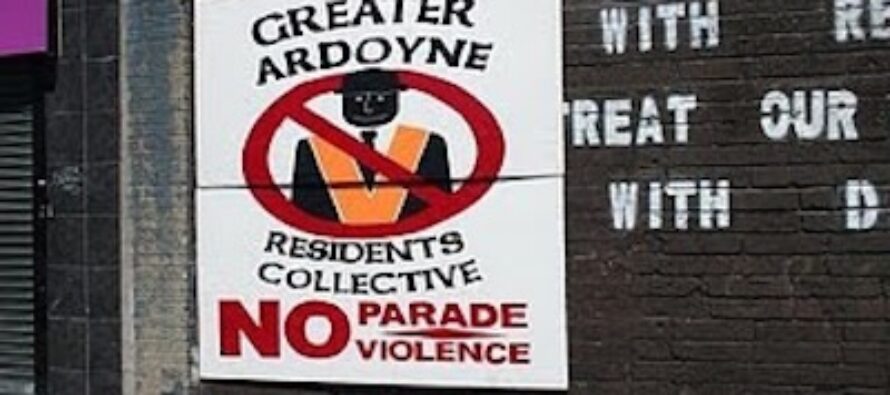Interface areas brace for parades

![]()
Tensions are running high in a number of flashpoint areas in advance of the ‘Twelfth’ parades, and thousands of PSNI police have been deployed to facilitate the marches by the anti-Catholic Orange Order.
Sunday marks the anniversary of the victory by the Protestant King William of Orange over Catholic King James at the Battle of the Boyne in 1690. Over 800 sectarian marches are taking place to mark the event over the weekend, the height of the marching season.
The Parades Commission, the body set up to rule on the marches, has imposed restrictions on more than 50 of them. The biggest display will be in Belfast where 71 bands and hundreds of Orangemen will march through the city centre.
One of the largest operations will be mounted at Ardoyne, where permission has been given for Orangemen to parade down a section of the nationalist Crumlin Road on the morning of July 12, although the return route is prohibited in the evening.
Last year there was no disorder in Ardoyne, but previous years have seen trouble and rioting. This year, a nationalist residents’ group is to stage a peaceful protest against the feeder parade past the Ardoyne shops.
The Greater Ardoyne Residents Collective (GARC) condemned a Parades Commission determination that only 60 people can attend the GARC protest on Monday morning.
“GARC wish to remind the public that it has been proven in court that as many people as possible can stand and monitor parades for breaches of determinations. Therefore we repeat our call for residents and supporters from other areas to assemble at Estoril Park/Ardoyne Road at 8am on Monday morning,” a statement read.
NEWRY
In Newry, a total of twelve sectarian parades are planned over the next four days, and severe disruption is expected in the predominately nationalist town as result.
eirigi’s Newry representative Stephen Murney said local residents are becoming increasingly frustrated at the disruption and inconvenience caused, “not to mention they have to endure the spectacle of participants in these triumphalist parades dancing around the streets of Newry”.
He described the parades as coat-trailing exercises.
“The organisers of these marches, along with unionist representatives, constantly tell us that these are “fun filled events” with a “festival atmosphere” which take place to express “culture”.
“The reality is that the organisations which take part, such as the Orange Order, are founded on bigotry and hatred. It was just a few months ago that unionist thugs in band uniforms attacked a local resident’s car causing damage and fear to the victims. That particular incident was highlighted in the local media.”
He said the scourge of sectarianism had no place in today’s society.
“These unwanted parades should be stopped indefinitely and the people of Newry should be allowed to go about their daily business without being subjected to a hate filled display of bigotry year in and year out.”
CASTLEDERG
A Parades Commission decision to re-route a loyalist band parade away from Castlederg’s Lurganboy Road has been welcomed by Sinn Fein, but three other parades in the town have only minor restrictions, a decision described as “incomprehensible”.
Castlederg Young Loyalists Flute Band had applied to march along the contentious route tonight [Saturday night]. It is one of two loyalist parades due to take place in the town on the so-called ‘Eleventh Night’.
Sinn Fein’s Ruairi McHugh said that reservations remained about determinations pertaining to the other July 11 parade and two further marches on July 13, and called for “constructive dialogue” to resolve the dispute.
DRUMCREE
However, one previously infamous parades took place without incident last weekend, when the Orange Order in Portadown marked the 20th anniversary of the Drumcree stand-off.
Members of the Order have staged weekly protests at the site since they were banned from marching along the mainly nationalist road in 1998. After attending a service at Drumcree Church last Sunday, Orangemen marched to police lines where a token protest was held.
Garvaghy residents spokesman Breandan MacCionnaith continues to urge members of the Orange Order to consider an alternative route. “Our community has moved on, others need to do likewise,” he said.
Related Articles
Intifada in musica – il rap palestinese (di Lazyproduction)
![]()
Molti di noi, guidati da cattiva informazione stampata e pessima tv, sono abituati a vedere le popolazioni del mondo arabo
ALFONSO SASTRE. LA PACE E’ UN IDEA SOVVERSIVA
![]()
Intervista di Fermin Munarriz
Gara. Dicono che è il più grande drammaturgo spagnolo degli ultimi decenni. Ed anche basco. Perché ha deciso di esserlo. E di vivere in un paese che ama e ammira. La sua estesa opera è stata un impulso permanente contro la censura; la sua vita, un impegno con la libertà; il suo pensiero, una esplorazione costante della essenza umana. Dalla torre di guardia intellettuale o dall’asfalto della strada, è sempre stato – ed è – per chi lo necessita. Non ha risparmiato generosità. Ne lucidità. Per questo non lotta contro i mulini; lotta contro i giganti.
Signor Sastre: tragedia, commedia…In che funzione sta in questo momento l’ordine mondiale?
Non è facile spiegare la realtà con questi concetti…Già nel Rinascimento vennero smontati questi feticci e nacque la tragicommedia, che è una visione più complessa della realtà. La tragicommedia iniziò a dare grandi frutti: la tragedia grottesca, l’esperpento. (stile letterario basato sulla deformazione grottesca della realtà). E’ qui dove si trova il genere che possa riflettere la realtà attuale: una tragicommedia o un esperpento o una tragedia che fa ridere..Per me è una tragedia complessa. Siamo in un momento nel quale possiamo ridere però non piangere. Non è un momento per ridere ne un momento per piangere, ma di ridere per non piangere.
E nel caso di Euskal Herria?
Euskal Herria non è un caso speciale. In altri temi ha una caratteristica differente rispetto a quanto avviene in altri luoghi, però per quanto riguarda se è da ridere o da piangere, si può dire che una situazione nella quale si ride per non piangere, però che ci sono molte ragioni per piangere.
Viviamo, forse, una sorta di penitenza per la non rottura democratica con il franchismo?
In Euskal Herria si verificò una forte resistenza alla Riforma, che anche la sinistra spagnola preconizzava. Arrivò un momento nel quale le idee della necessita di una rottura democratica scomparvero dai territori di Spagna e si rifugiarono in Euskal Herria; è qui dove cristallizzarono le idee del fatto che non si andrà da nessuna parte che meritasse la pena se non si verificava una nuova situazione in termini di rottura. Queste idee cristallizzarono qui e sono l’origine di ciò che poi fu la sinistra indipendentista. Questa fu una delle ragioni – a parte molte altre – del fatto che noi decidemmo venire qui. Vedemmo che le nostre idee più o meno erano socialmente ammesse in questo paese e no in Spagna.
In questo contesto, qual è la responsabilità morale dell’intellettuale nella società?
E’ la stessa di sempre: essere fedele alla sua vocazione intellettuale. E’una vocazione per la verità, per l’esplorazione della verità e per la difesa della giustizia. Sembra che alcuni intellettuali assumano questa responsabilità ed altri la appartino un po’ e si limitano formalmente a lavorare a favore dell’intelligenza in termini di disimpegno totale da un punto di vista politico.
Crede che gli intellettuali baschi sono all’altezza della situazione?
Io ho un problema per poter rispondere a questa domanda al non essere capace di leggere ciò che scrivono gli intellettuali baschi in euskera. Qualsiasi opinione esprimessi sarebbe superficiale e sicuramente ingiusta. Però nel teatro, dove si vedo quanto si fa, più o meno, o quanto si pretende fare, credo che le genti del teatro basco non sono all’altezza delle circostanze nelle quali si vive in questo paese. Io ho cercato in alcune occasioni di far interessare ai miei colleghi nell’ esempio – non per seguirlo ma forse per ispirarsi ad esso – di ciò che fu il teatro irlandese nelle prime decadi del secolo XX. In alcune circostanze analoghe – con distinguo – nacque un teatro magnifico, di grande livello in Europa.
Il teatro in castigliano si manifesta abbastanza al margine delle questioni più patenti e latenti di questa società. E’ un teatro che guarda da un’altra parte e non per la realtà; forse per paura a guardare la realtà. La realtà a volte mette paura, anche questo è vero.
Gli intellettuali spagnoli e francesi sono all’altezza delle circostanze rispetto al caso basco?
No, sono all’altezza della loro ignoranza su questa situazione. Io credo che sono ignoranti. Lo vedo con gli spagnoli che conosco, sono più o meno alla pari –diciamo, in tutto, meno su questo tema. Quando si tratta il tema basco lo ignorano e, inoltre, sembra che rifiutino d comprenderlo…
A cosa si deve questo atteggiamento?
Al patriottismo, allo sciovinismo da grande potenza…Lenin già parlava del patriottismo sciovinista; faceva una critica a ciò che si chiamava sciovinismo da grande potenza. E Spagna e Francia sono grandi potenze in relazione a Euskal Herria. Lo sciovinismo è una filosofia comune che impedisce assolutamente vedere ciò che accade qui. E’ molto difficoltoso. Mi dicono amici che vivono a Madrid, per esempio, quanto difficile sia fare comprendere alcune cose che si comprendono vivendo qui. E si deve al patriottismo spagnolo completamente accecante.
A FIANCO DI EMERGENCY (VIDEO)
![]()
Tre operatori italiani dell’ospedale dei Emergency a Lashkargah, nella provincia meridionale di Helmand, sono stati arrestati dalle forze di sicurezza



